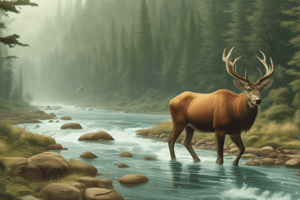Podcast
Questions and Answers
What is a key concept in ecology that challenges the idea of a stable equilibrium in natural systems?
What is a key concept in ecology that challenges the idea of a stable equilibrium in natural systems?
- The potential for natural systems to return to their original state after a disturbance
- Adaptation of organisms to their environment
- The complexity of ecological interactions and the role of random perturbations (correct)
- The linearity of relationships between environmental components
Which of the following is a characteristic of natural systems that can lead to the formation of different communities in the same area?
Which of the following is a characteristic of natural systems that can lead to the formation of different communities in the same area?
- Similar environmental conditions (correct)
- Random perturbations and disturbances
- Linear relationships between environmental components
- The ability of natural systems to return to their original state
What is the primary focus of environmental science?
What is the primary focus of environmental science?
- Developing new technologies to exploit natural resources
- Addressing environmental problems and understanding human impact on the environment (correct)
- Studying the social sciences and their impact on the environment
- Understanding the natural world and its components
What is an example of an adaptation in response to changing environmental conditions?
What is an example of an adaptation in response to changing environmental conditions?
What is a consequence of the interconnectedness of events in nature?
What is a consequence of the interconnectedness of events in nature?
What is a key difference between ecology and environmental science?
What is a key difference between ecology and environmental science?
What is the primary mechanism by which the frequency of a characteristic may increase in a population over time?
What is the primary mechanism by which the frequency of a characteristic may increase in a population over time?
What is the term for the amount of energy that producers fix through photosynthesis or other means, minus the amount they use in cellular respiration?
What is the term for the amount of energy that producers fix through photosynthesis or other means, minus the amount they use in cellular respiration?
Which of the following is an example of an abiotic factor?
Which of the following is an example of an abiotic factor?
At which level of ecological hierarchy would you study the interactions between a group of individuals of a single species?
At which level of ecological hierarchy would you study the interactions between a group of individuals of a single species?
What is the term for the cyclic movement of a nutrient between organisms and the physical environment?
What is the term for the cyclic movement of a nutrient between organisms and the physical environment?
What is the term for the study of interactions across many levels of organization, including individuals, populations, communities, and ecosystems?
What is the term for the study of interactions across many levels of organization, including individuals, populations, communities, and ecosystems?
What is the term for an organism that uses energy from an external source, such as the sun, to produce its own food?
What is the term for an organism that uses energy from an external source, such as the sun, to produce its own food?
Which of the following spatial scales would be considered large?
Which of the following spatial scales would be considered large?
Flashcards are hidden until you start studying
Study Notes
Ecology as a Scientific Endeavor
- Natural systems do not always return to their original state after a disturbance, and random perturbations can play a significant role.
- Different communities can form in the same area under similar environmental conditions.
- Ecological interactions are more complex than previously thought, with no linear relationships.
- Events in nature are interconnected, and a change in one part of an ecological system can alter other parts.
Environmental Science
- Focuses on how people affect the environment and how to address environmental problems.
- Incorporates concepts from the natural sciences and the social sciences.
Key Terms
- Adaptation: A feature of an organism that improves its ability to survive or reproduce in its environment.
- Natural Selection: An evolutionary process in which individuals with particular traits survive or reproduce at a higher rate than others due to those characteristics.
- Producer (Autotroph): An organism that uses energy from an external source to produce its own food without eating other organisms or their remains.
- Consumer (Heterotroph): An organism that obtains its energy by eating other organisms or their remains.
- Net Primary Production (NPP): The amount of energy that producers fix through photosynthesis or other means, minus the amount they use in cellular respiration.
- Nutrient Cycle: The cyclic movement of a nutrient between organisms and the physical environment.
Ecological Scales
- Spatial Scales: The size of the study, ranging from small (e.g., soil microorganisms) to large (e.g., atmospheric pollutants).
- Temporal Scales: The time frame of the study, ranging from short (e.g., leaf response to sunlight) to long (e.g., species change over geologic time).
- Ecologists study interactions across many levels of organization, often emphasizing individuals, populations, communities, or ecosystems.
- Ecological studies include biotic and abiotic factors of natural systems.
- Every ecological study addresses events at some scales but ignores events at other scales.
Ecological Hierarchy
- Individuals: Studying a specific individual that lives in a particular area.
- Population: A group of individuals of a single species that live in a particular area and interact with one another.
- Community: An association of populations of different species in the same area.
- Ecosystem: A community of organisms and their physical environment, including biotic and abiotic factors.
- Landscapes: Areas that include multiple ecosystems.
Studying That Suits You
Use AI to generate personalized quizzes and flashcards to suit your learning preferences.




